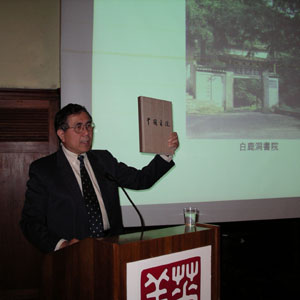|
中國書院﹕完美道德的學習與追求

華美協進社
(China
Institute) 人文學會舉辦的《中華文化系列講座》十一月二十日下午兩點至四點將由紐約市立大學李弘祺教授主講《中國書院﹕完美道德的學習與追求》。
中國書院從八世紀至二十世紀早期﹐一種是中國私塾教學的主流﹐其推廣的儒家思想教育一直為中國道教教育的藍本﹐直至宋朝末期﹐中國已有四百多家書院。許多學人都以書院作為宣揚自己思想的渠道﹐其後許多書院漸發展為由政府資助﹐為文人參加科舉考試而設立的傳統進身仕宦的途經。因此﹐書院制度一直為廣大民眾提供教育﹐但最主要的還是著力于個人道德休養進修的任務。
李弘祺教授是研究中國傳統教育的著名學者。
The
Chinese Academy:
Center
of Traditional Learning and Moral Cultivation
Thomas
H. C. Lee
Professor
of History and Director of Asian Studies Program, The City
College of New York, and
Professor
of Chinese History, The Graduate School, The City University
of New York
The
publication of Chinese
Academies 中國書院 by Shanghai Educational Publishing House is an important monument not
only in China’s publication history, but also in the study
of traditional Chinese academies. Richly illustrated with
pictures of academies, this book provides a good
introduction to this important educational institution in
Chinese history. I
wrote the English introduction to this book.
Chinese
academies date back to the eighth century, but they took on
the most important form in the twelfth century, influenced
particularly by Zhu Xi, whose educational philosophy shaped
the development of the academies for the next eight
centuries.
The
academies were founded primarily to provide Confucian
education that was centered in the learning of Confucian
classics. The ultimate purpose of Confucian or Neo-Confucian
(as taught by Zhu Xi and his many other contemporaries and
their followers) education was the cultivation of a moral
personhood. Academies often took a critical attitude towards
the more utilitarian approaches of the Chinese civil service
examinations, even though eventually many academies were
co-opted into government school system, and were founded
primarily to prepare examination candidates. By 1905, when
traditional Chinese academies were ordered to teach modern
curriculum, more than 8,000 academies had been founded one
time or the other.
In
this lecture, I will discuss the history, educational
ideals, and architectural characters of the academies, using
pictures taken from Chinese Academies to illustrate my points.
Professor
Thomas H. C. Lee is
Professor of History and Director of Asian Studies Program
of The City College of New York. He also is Professor
Chinese History in the Graduate School of The City
University. Professor Lee is from Taiwan and holds a Ph.D.
from Yale University. He taught in The Chinese University of
Hong Kong for many years before joining The City College. He
specializes in Chinese educational and intellectual history,
having published Government Education and Examinations in
Sung China, and Education in Traditional
China, a History. He has also published two other
English books: China and Europe, Images and Influences in
the Sixteenth to Eighteenth Centuries and The New and
the Multiple, Sung Senses of the Past.
|